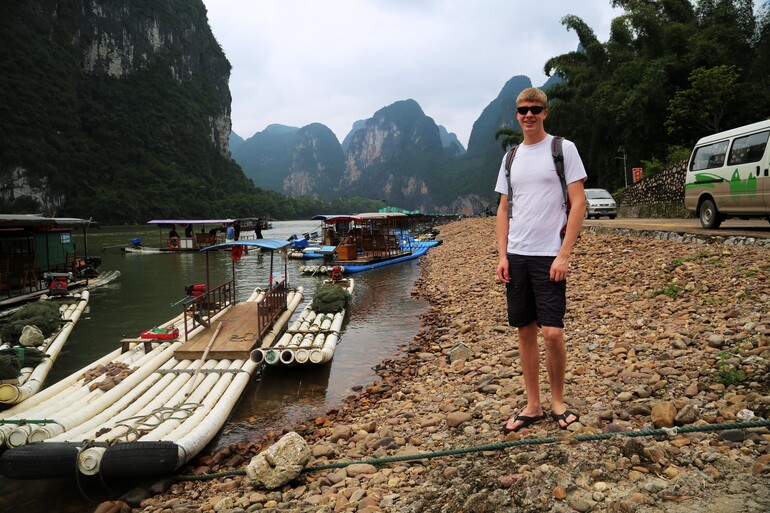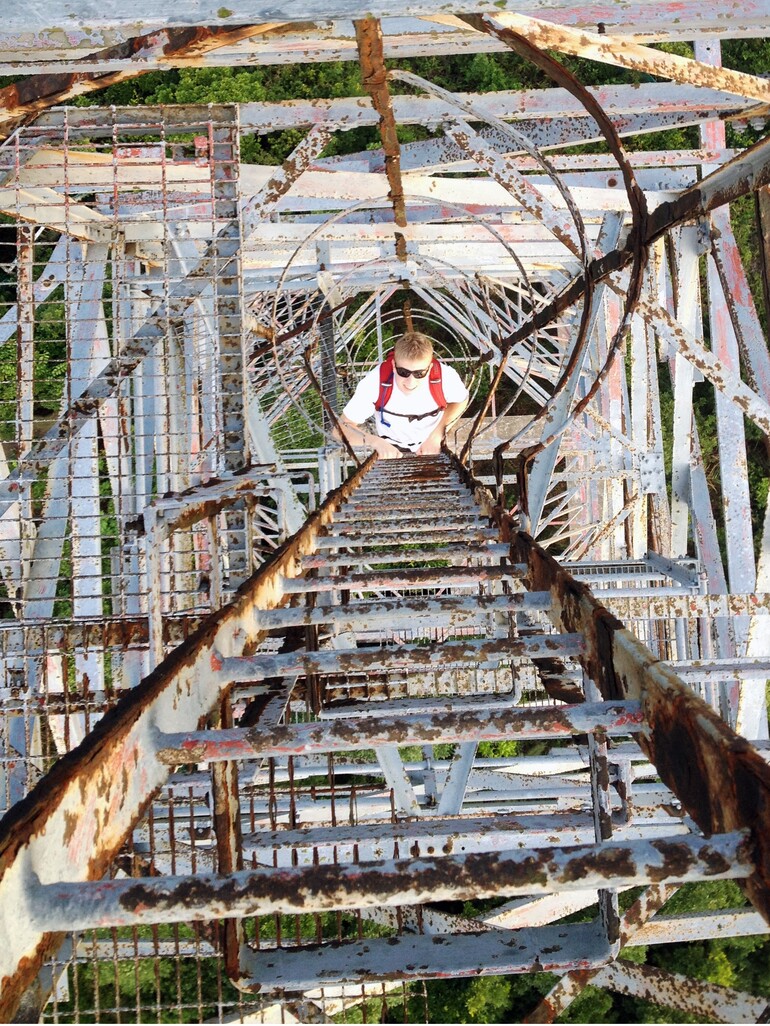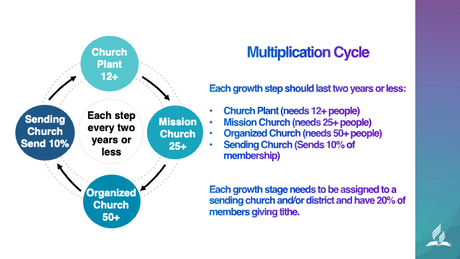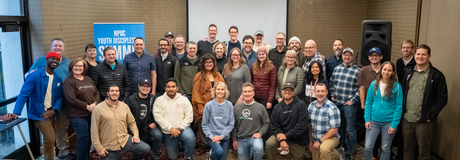Editor's Note: This article was written recently by Michael Jensen, Walla Walla University student, while he was finishing a year in Hong Kong as a student missionary.
A student missionary faces the unknown and learns how to undermine fear.
What is fear? This was not exactly the question running through my mind as I climbed hand-over-hand up a rusted ladder toward the top of a fire lookout tower perched on one of Hong Kong’s many hills. Instead, I was primarily focused on a much more pragmatic issue: How much longer will these rusted bolts support my weight? The thought of a ladder section falling loose was terrifying, since I was basically hanging in free space supported by nothing but the ladder itself. Even the safety cage behind the ladder was bolted to nothing but the ladder itself. If the bolts from which each ladder section hung were to fail, it would be all over. Nevertheless, I continued my climb, knowing it was a bad idea but gaining a better view with each rung.
Life as a student missionary in Hong Kong has been a series of lessons on the topic of fearless living. During my service in this city, I have learned the philosophical lesson clearly demonstrated in my tower climb: oftentimes, the most fulfilling and important experiences are downright reckless.
“Reckless” is defined as “heedless of danger or the consequences of one’s actions; rash or impetuous” (Oxford English Dictionary). Put another way, recklessness is diving into something without fixating on the potential danger or consequences. Most times I set off on a new adventure, I’m being just a little bit reckless. I rarely really know what I’m doing or what the end result of my efforts will be. Nevertheless, I do it anyway. I could focus on the fear generated by my lack of knowledge. In the case of my ladder climb, I could have allowed myself to become paralyzed by my lack of knowledge about whether I would make it down safely or not, or what it might feel like to fall. Instead, I just climbed.
My decision to serve as a student missionary in Hong Kong was similarly reckless. When my aunt, who works as director of the Chinese Union’s development department, initially mentioned the idea of me working for her as a student missionary in Hong Kong, it was as an offhand suggestion. She didn’t know how seriously I was looking for an opportunity exactly like she described. In my mind, I had already decided to take the next year off and enhance my life by living overseas.
What I hadn’t decided was whether I would work as a regular employee of an overseas company, or as an intern, or as a student missionary. Although I was interested in the notion of serving as a missionary, most student missionary calls seemed to be for teachers or medical workers — jobs I was not looking to fill. Upon hearing that my aunt was looking for someone to work as a communications trainee for the development department, I felt drawn to the opportunity. I took it seriously, even though it had been mentioned casually.
After a brief period of consideration, I chose to forge ahead with the idea. My path to Hong Kong was paved with a number of challenges, primarily surrounding procuring a visa. Nevertheless, I now find myself living in Hong Kong, nearing the end of my term as a student missionary.
At the outset of this adventure, there was no good way for me to feel like I knew what I was doing. To some degree, I faced fear. I didn’t really know what life in Hong Kong would be like, or whether I would enjoy my time as a student missionary. I could make educated guesses based on past experience, but in a fairly significant way, I was stepping into the unknown. Only now, looking back on my wonderful experience in Hong Kong, can I say that I made the right decision.
Numerous other experiences I’ve had as a student missionary in Hong Kong have served to illustrate this lesson. On one occasion, Christian (a close friend from high school serving as a student missionary with me) and I were asked to present a talk on courtship and marriage at a conference of African students in northern China. Nothing about that was comfortable to me. On its own, regular public speaking is intimidating enough. However, speaking to a group of students who shared a culture completely different from my own, on a topic with which I have essentially zero experience, pushed the limits of what I was willing to accept as a work assignment.
In a very tangible sense, I faced fear. As with my experience climbing the lookout tower and my experience accepting a role as a student missionary in Hong Kong, the only way past my fear was reckless: accept the assignment despite my internal objections and just go for it. By saying “yes” to presenting at the conference, I was jumping headlong off a high dive with no way to back out. At that point, fear became irrelevant because there was nothing I could do to change the situation other than getting it done.
On another occasion, Christian and I were rock climbing at a scenic crag near downtown Hong Kong. It was near the end of the day, and, being novice climbers, we were pondering whether or not we could successfully complete an exciting-looking multipitch route that was just a bit above our skill level. While we stood at the base of the route, verbally contemplating whether to attempt it or not, two Scottish guys who had just climbed it gave us some profound advice: “You lads have the wrong mentality — just get it done!” While we were looking for all kinds of reasons to avoid tackling the route, the Scottish climbers reminded us to focus on just doing it rather than letting the fear of the unknown stand in the way of success.
Fear exists to combat recklessness. It helps us understand on a cognitive and emotional level that there may be consequences assorted with our actions. In many cases, that’s a good thing. Without fear, there would be little to protect us from making dangerous choices (such as my foolish decision to climb that lookout tower).
However, fear can also prevent us from making choices that would be best for us. God often leads His children up routes that they find intimidating. To the rest of the world, following such paths seems reckless. Nevertheless, the Bible is fairly unambiguous when speaking about this type of fear: “For God has not [emphasis supplied] given us a spirit of fear, but of power and of love and of a sound mind” (2 Tim. 1:7, NKJV).
When describing the characteristics of a good wife (in a way that sounds uncannily similar to his personification of wisdom), Solomon writes that “strength and dignity are her clothing, and she laughs at the time to come” (Prov. 31:25, ESV). One cannot “laugh at the time to come” when paralyzed by fear. No, staring into the murky future and laughing requires a deep and powerful confidence.
But how can one step into the unknown — unable to maintain control or predict outcomes — without fear?
The answer is quite simple: trust in God. Trust in an omniscient, omnipotent Friend is the only thing that separates genuinely reckless activities like my tower climb from apparently reckless decisions like following God’s leading anywhere. When one trusts his or her Caretaker to manage a situation, he or she no longer needs to worry about the dangers or outcomes. Instead, upon hearing God’s call to tread some intimidating path, he or she can charge on in reckless abandon, trusting that it will be okay because God said so.
There are few if any situations in life where one can truly be certain about safety or outcomes. For that reason, venturing into the unknown is absolutely vital to leading a fulfilling (and godly) life — not because being unprepared or uncertain is inherently positive, but because if one waits to take action until things are safe or certain, one will never take action. By living a life underpinned by genuine trust in God, fear is no longer paralyzing. That is the lesson of my experience as a student missionary in Hong Kong: Trust God, then charge on.
Audrey Folkenberg, Chinese Union Mission of Adventists development department director









